Демоверсия ОГЭ АНГЛ.ЯЗЫК | LANCMAN SCHOOL

2277
Поделиться:В 2019 году все учащиеся 9 классов должны будут получить допуск к выпускным экзаменам. Для этого 13 февраля 2019 года они должны будут получить «зачёт» на итоговом собеседовании.
В 2019 году все выпускники дошжны будут сдать 4 ОГЭ: 2 обязательных (ОГЭ по русскому языку и математике) и 2 экзамена по выбору. Баллы за каждый из четырёх ОГЭ будут переведены в оценки. Соответствие баллов оценке будет объявлено накануне экзаменов. На Федерально портале «Российское образование» можно посмотреть официальную информацию о том, как переводить первичные баллы ОГЭ в оценки. Обращаем ваше внимание, что цифры носят РЕКОМЕНДАТЕЛЬНЫЙ характер. В аттестат обычно ставится средний показатель между оценкой за ОГЭ и годовой отметкой по предмету. Баллы за ОГЭ будут напрямую влиять на то, смогут ли выпускники 9 классов претендовать на место в 10 профильном классе.
Если ученик получит «двойку» хотя бы по одному экзамену, то получить аттестат он не сможет, пока не пересдаст ОГЭ повторно на удовлетворительный результат (то есть преодолеет минимальный порог баллов). Если ученик получит одну или две «двойки» на ОГЭ, то каждый экзамен он сможет переписать дважды — в резервные дни и в дополнительный период. Если учащийся получает неудовлетворительные результаты по 3 или 4 ОГЭ, то пересдать экзамены он сможет лишь в сентябре. В случае успешной пересдачи каждый выпускник получает аттестат (даже если он пересдавал в сентябре).
Изменения в КИМах ОГЭ по английскому языку в 2019 году
В критерии оценивания задания № 33 (личное письмо) внесены уточнения:
1. Ответ на задание 33 (личное письмо) оценивается по критериям К1–К4 (максимальное количество баллов – 10).
2. При получении учащимся 0 баллов по критерию «Решение коммуникативной задачи» ответ на задание 33 оценивается в 0 баллов.
3. Если объём письма менее 90 слов, то ответ на задание оценивается в 0 баллов. Если объём более 132 слов, то проверке подлежат только 120 слов, т.е. та часть личного письма, которая соответствует требуемому объёму.
4. При определении соответствия объёма представленной работы требованиям считаются все слова, с первого слова по последнее, включая вспомогательные глаголы, предлоги, артикли, частицы. В личном письме адрес, дата, подпись также подлежат подсчёту.

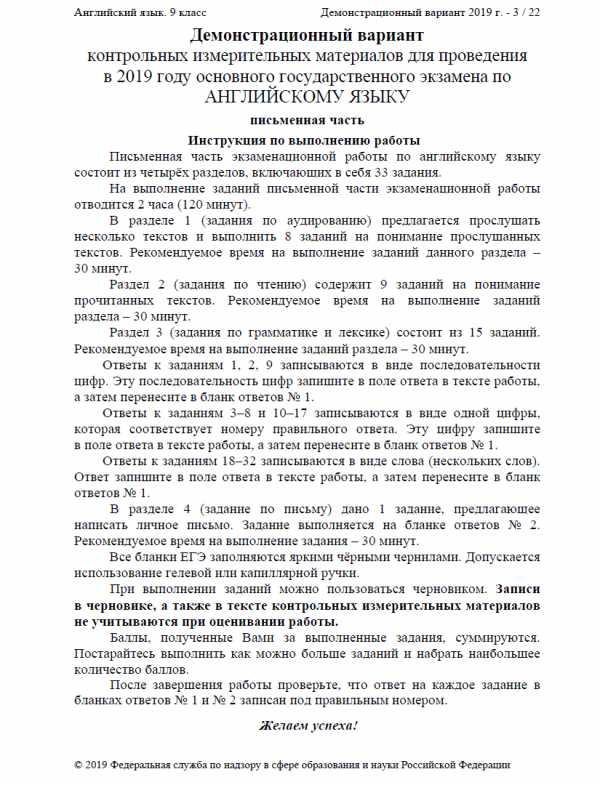
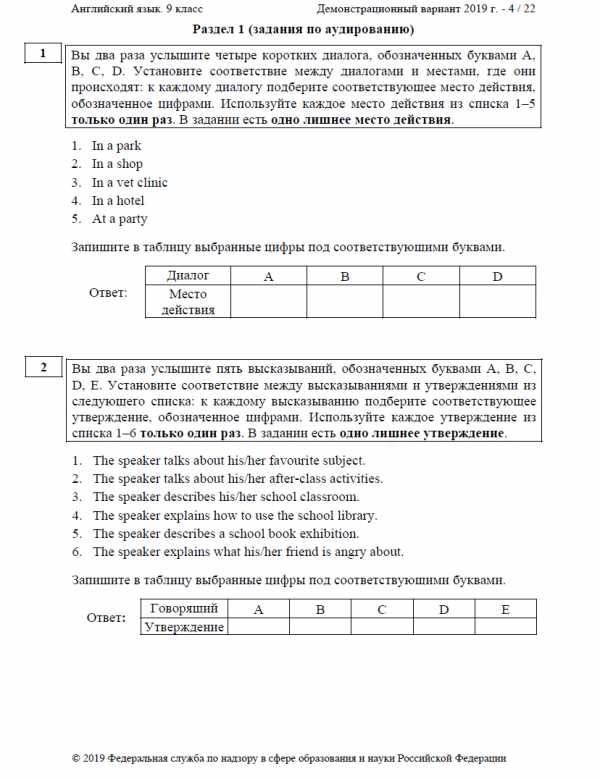
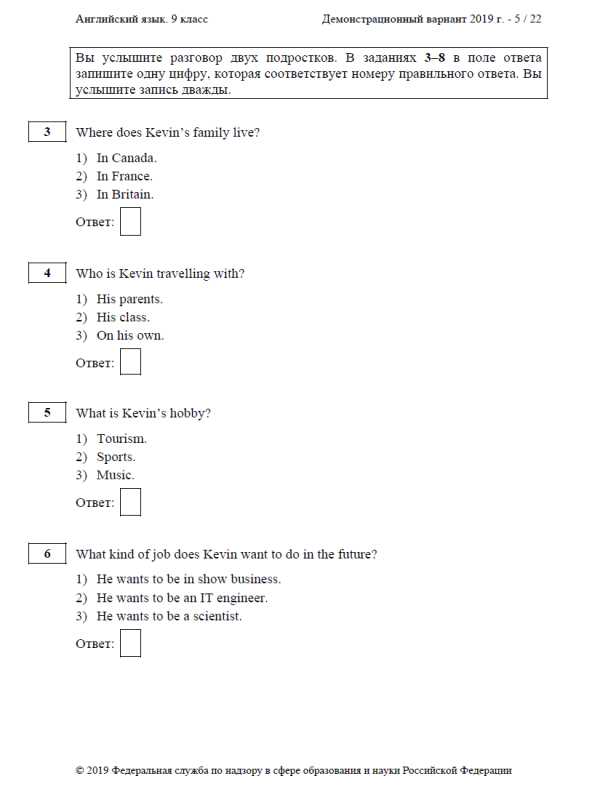

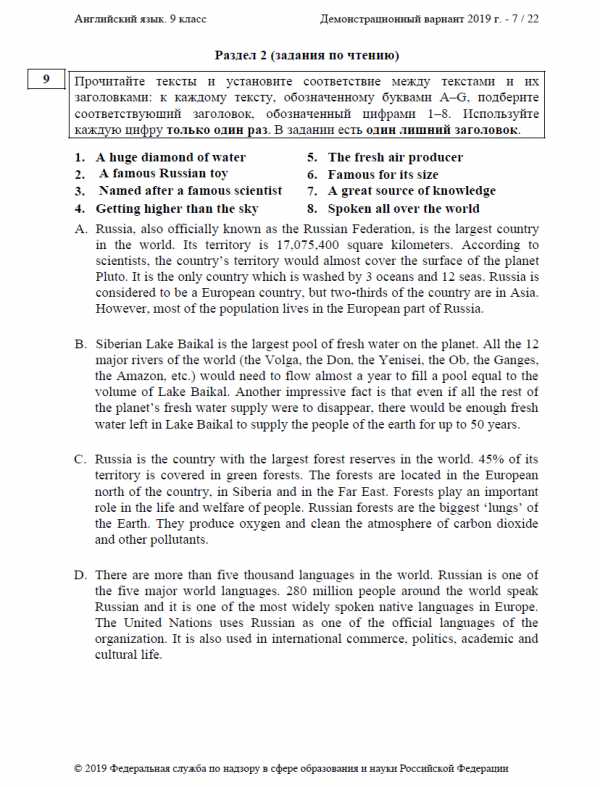
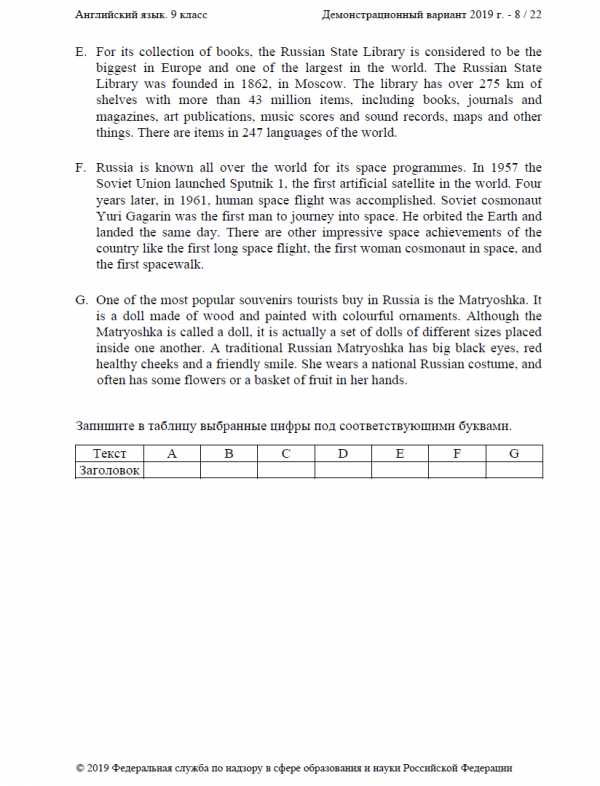
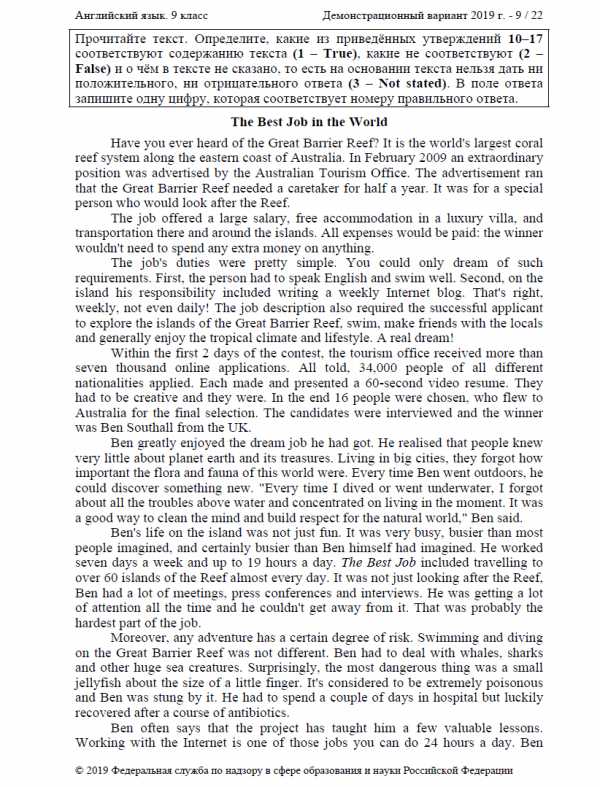
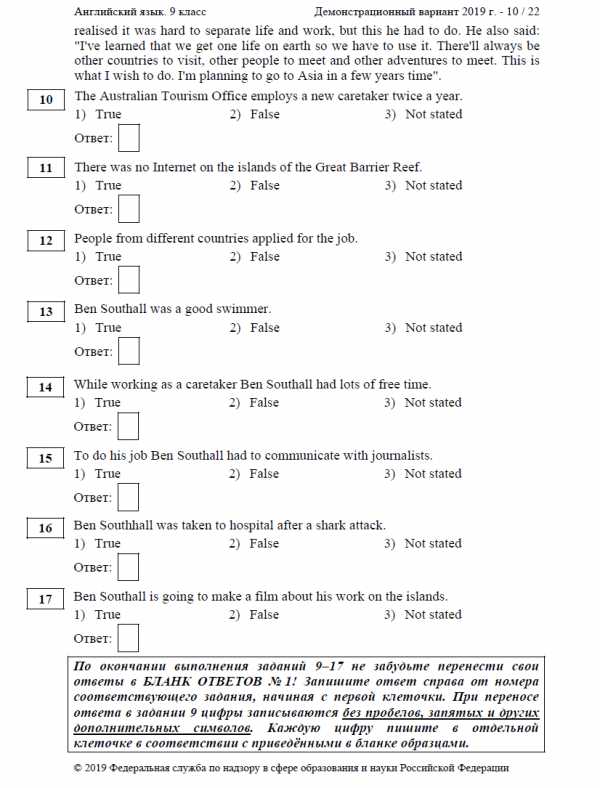
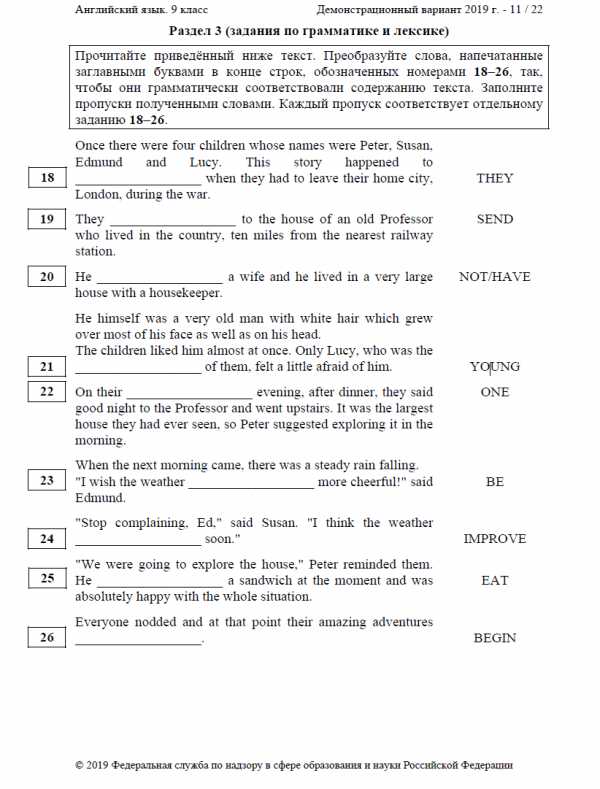
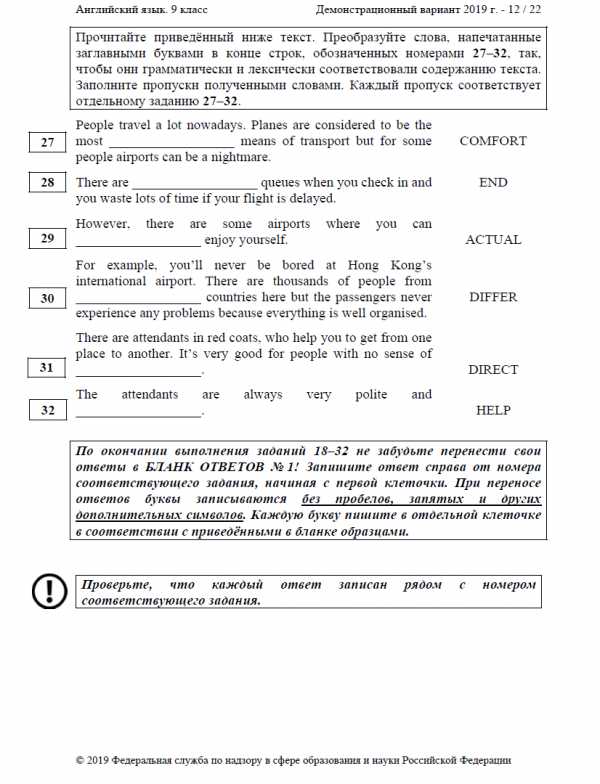

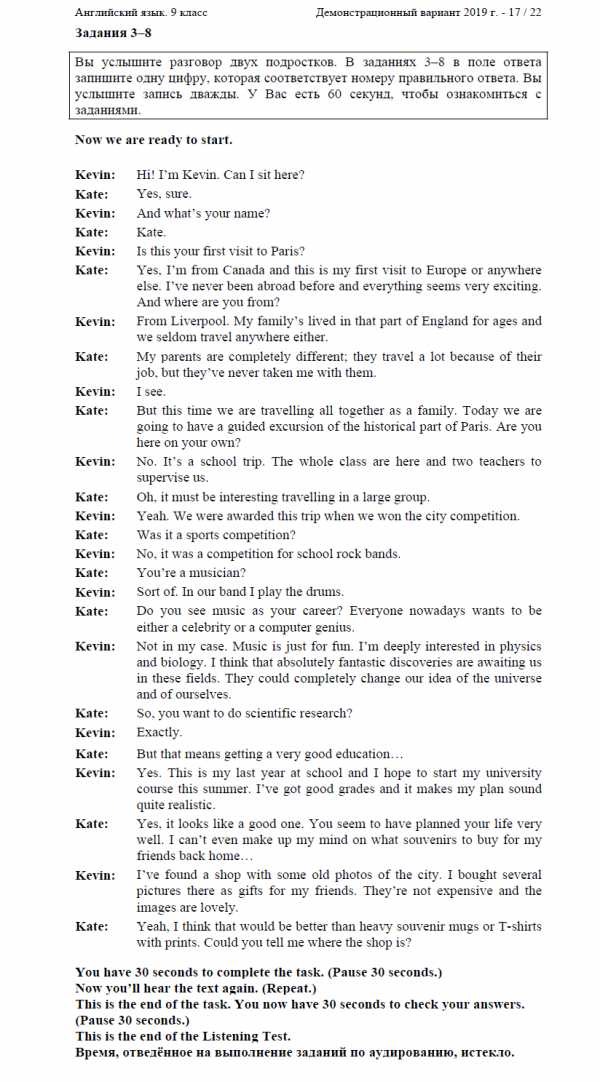

Источник: http://fipi.ru/oge-i-gve-9/demoversii-specifikacii-kodifikatory
2277
Поделиться:Демоверсия-2017 по английскому языку (ОГЭ)
Документы, определяющие содержание контрольных измерительных материалов основного государственного экзамена:
— кодификаторы элементов содержания и требований к уровню подготовки обучающихся, освоивших основные общеобразовательные программы основного общего образования;
— спецификации контрольных измерительных материалов для проведения основного государственного экзамена по общеобразовательным предметам обучающихся, освоивших основные общеобразовательные программы основного общего образования;
— демонстрационные варианты контрольных измерительных материалов для проведения основного государственного экзамена по общеобразовательным предметам обучающихся, освоивших основные общеобразовательные программы основного общего образования.
Изменения в КИМАХ 2017:
Изменений нет
ФИПИ Открытый банк заданий ОГЭ
Английский язык
Открытый банк заданий (все предметы)
Демонстрационный вариант контрольных измерительных материалов
для проведения в 2017 году основного государственного экзамена
по АНГЛИЙСКОМУ ЯЗЫКУ
Скачать
Говорение
Task 1. You are going to read the text aloud. You have 1.5 minutes to read the text silently, and then be ready to read it aloud. Remember that you will not have more than 2 minutes for reading aloud.
The ninth planet of the solar system was discovered not long ago. It happened in 1930. Scientists had been hunting for the planet for a long time. They had calculated its probable position but there was no proof that the planet really existed. It was too far away for the telescopes of that time to find it. It’s worth mentioning that the first photos of the planet were taken by a very young researcher. He was only twenty-four and had no formal education in astronomy. However he was deeply involved in the search for the ninth planet. The planet at the edge of the solar system was called Pluto, after the Roman god. The name for the planet was suggested by an 11-year-old British girl.
|
Task 2. You are going to take part in a telephone survey. You have to answer six questions. Give full answers to the questions. Remember that you have 40 seconds to answer each question. |
Task 3. You are going to give a talk about photography. You will have to start in 1.5 minutes and speak for not more than 2 minutes.
Remember to say:
- why people like taking pictures
- why taking photos is more popular today than it was in the past
- what the best photo you have ever taken is
You have to talk continuously.
Аудирование
|
|
Вы услышите разговор двух подростков. В заданиях 3–8 в поле ответа запишите одну цифру, которая соответствует номеру правильного ответа. Вы услышите запись дважды.
|
|||||||||
|
|
The language Cathy has NEVER learnt is |
|||||||||
|
|
Allan’s favourite film genre is |
|||||||||
|
|
This Saturday Cathy is going to |
|||||||||
|
|
Cathy has recently been to |
|||||||||
|
|
|
Next summer Allan is planning to go to |
|||||||||
|
Чтение
|
Прочитайте тексты и установите соответствие между текстами А–E и заголовками 1–6. Запишите свои ответы в таблицу. Используйте каждую цифру только один раз. В задании есть один лишний заголовок.
|
|
|
Прочитайте текст. Определите, какие из приведённых утверждений 10–17 соответствуют содержанию текста (1 – True), какие не соответствуют (2 – False) и о чём в тексте не сказано, то есть на основании текста нельзя дать ни положительного, ни отрицательного ответа (3 – Not stated). В поле ответа запишите одну цифру, которая соответствует номеру правильного ответа. Christmas Tree Memories My name is Ted. I grew up in the 50s, but my childhood memories are still alive. The most pleasant of them is the family Christmas tree. Besides my mum and dad, there were five children in the family. We all took part in decorating the Christmas tree, one way or another. It was a special time for me as dad took us for a trip to the winter forest. The experience was special as only boys were allowed to go to the countryside to pick out the tree. At the age of five I felt proud to be in a man’s adventure. I remember walking through the forest with dad looking for the perfect, large tree. We had a tall ceiling in the living room, so a small tree did not look right there. At the age of five, even a small tree seemed great to me. To measure a tree I raised my hands above my head and looked up. If I could reach the top of the tree I thought it was big enough. Dad, however, always chose the perfect tree very carefully. Once he had made his choice, he took out an axe to cut down the tree. I wanted to help my dad and brothers, but they always told me to stand back. When the cutting began, I tried to hold the tree up. I was afraid the tree would fall on them and I felt strong enough to hold it. After the tree was down we took it to the car and went back home. I don’t remember how we got that large tree through the door, but it was always right. Then dad got the tree to stand up and we could start the decorating. The tree, the boxes with decorations and a tall ladder took up the whole room. All the family took part as mum gave everyone a task. I had to pass the decorations. What I liked best about the Christmas tree were the lights. When everybody else had left I stayed in the room and watched the lights travelling up and down the Christmas tree. Dad had one more special job that day. Mum took her favourite ornament, a lighted angel, which she had got as a present from her family. Dad climbed up the ladder and fixed the angel at the top of the Christmas tree. When I looked at the angel, I thought Santa was close to my house. Everyone, and the decorated shining tree, was ready to celebrate Christmas. It was so big that it nearly touched the ceiling. I felt I was a small part of a big adventure. The last few years we lived in that house the trips to the forest with dad ceased. We bought an artificial tree instead.
|
|||||||||
|
|
When Ted’s father went to choose their Christmas tree, Ted stayed at home. |
|||||||||
|
|
Ted’s family lived in a small town. |
|||||||||
|
|
Ted’s father always chose a tall tree for Christmas. |
|||||||||
|
|
Ted’s mother preferred the Christmas decorations created by her children. |
|||||||||
|
|
A lighted angel was Ted’s favourite Christmas decoration. |
|||||||||
|
|
There was a star on the top of the Christmas tree in Ted’s house. |
|||||||||
|
|
Finally the family stopped having a live Christmas tree. |
|||||||||
|
Письмо
You have 30 minutes to do this task.
You have received a letter from your English–speaking pen friend, Ben.
… I enjoy travelling, and I travel a lot with my family.
…Do you like travelling, why? Where would you like to go? What is your favourite means of transport, why? …
Write him a letter and answer his 3 questions.
Write 100–120 words. Remember the rules of letter writing.
Языковой материал
|
Прочитайте приведённый ниже текст. Преобразуйте слова, напечатанные заглавными буквами в конце строк, обозначенных номерами 18–26, так, чтобы они грамматически соответствовали содержанию текста. Заполните пропуски полученными словами. Каждый пропуск соответствует отдельному заданию 18–26. By today’s standards, my mobile phone is pretty basic. It’s a Nokia. It’s a small device that receives telephone calls and sends text messages. Other than that, my phone _________NOT/DO_________ much. Most of my friends wish they _________HAVE_________ smartphones because they are cool and trendy. They say the _________GOOD_________ thing about a smartphone is that you ‘can do everything with it!’ That’s right, smartphones have many more functions than a simple phone, however, not all of them are needed. In everyday life, smartphones _________USE_________ mainly for checking social networking sites, replying to emails, and playing games. Grown-ups as well as ________CHILD__________ like playing games. Anyway, I prefer my good old Nokia. It’s my ________ONE__________ mobile phone. When I bought it, it didn’t cost _________I_________ very much. And I am not afraid anyone will ever steal it. It’s also very reliable. Yesterday I dropped it. It _________FLY_________ down the staircase and hit the wall. I thought that _________BE_________ the end of it and I would have to buy a new one. But nothing of the kind – it still works properly!
|
|
|
|
|
|
|
|
|
bobachenkos.ru
Демоверсия ГИА ОГЭ 2016 по английскому языку
Демоверсия ГИА ОГЭ 2016 по английскому языкуЗагрузка. Пожалуйста, подождите…
Образовательный сайт vpr-klass.com (впр-класс.ком) — готовые решения задач! У нас вы найдете много учебных материалов: решебники, ГДЗ, тестовые задания, видео уроки, генераторы задач, решения упражнений гиа и егэ.|
Расскажи друзьям Ищи САЙТ в Яндексе и Google по слову: vpr-klass или впр-класс Сохрани сайт в закладки — нажми Ctrl+D |
Интересно ГИА (ОГЭ) по математике Много разных решений Тесты ГИА онлайн. Видео — ГИА 2013: геометрия Видео — ГИА 2012 Видео — Демо-вариант 2012. Решение Демо-варианта 2013 года (2014 года). Задача №1, Вычислить. Задача №2, Числа и прямая. Задача №3, Сравнение чисел. Задача №4, Уравнения. Задача №5, Графики и формулы. Задача №6, Прогрессии. Задача №7, Упростить выражение. Задача №8, Неравенства, системы неравенств. Задача №9, Задания по геометрии. Генератор вариантов ГИА 2014 ЕГЭ по математике Много разных решений. Онлайн тесты. Видео уроки ЕГЭ по математике. Генератор вариантов ЕГЭ 2014 Книги, справочники Решение демо варианта ЕГЭ по математике 2014 Задания B1, задача. Задания B2, диаграммы. Задания B5, уравнения. Задания B8, производная. Задания B10, вероятность. ОГЭ по информатике Видео уроки |
vpr-klass.com
Ответы и решение – Демоверсия ОГЭ 2018 АНГЛИЙСКИЙ ЯЗЫК
Ответы и решение – Демоверсия ОГЭ 2018 АНГЛИЙСКИЙ ЯЗЫК проект
Раздел 1 (задания по аудированию)
1)
Dialogue А — In a shop
A: Can I help you?
B: Yes, please. You see, I want to adopt a puppy, but I don’t know much about
dogs or how to take care of them.
A: Right. I can recommend this book. Have a look – it gives a detailed
description of the most popular breeds of dog so that you can choose which
is the best for you.
B: Oh, and it also contains very good pictures! These puppies are so cute! Yes,
I’m taking it …though the price is rather high… Anyway.
A: The cash-desk is over there.
B: Fine. Thank you.
Dialogue B — In a hotel
A: I’ve got a complaint, I’m afraid.
B: What’s happened, sir? Just let us know. We do everything we can to keep
our guests happy.
A: The problem is …that …there’s a dog in the room next to mine.
B: Yes, and what’s the actual problem? Many of our visitors choose us for just
that reason. We admit pets which is very convenient for those who travel
with animals.
A: But why did nobody tell me about that? The dog barks! I can’t sleep
properly at night.
B: Sorry, sir. But the only thing we can do is to offer you another room. I’ll just
check which one would be quieter.
Dialogue C — In a park
A: It’s pretty cold today, isn’t it?
B: Yes, it is. But I’ve got used to walking in any weather.
A: Is it because you have to walk your dog?
B: Yes. Twice a day, at least. We are heading to the pond at the moment – there
are special facilities for dogs there, like ladders and ramps. Are you going
there too?
A: Oh, no, I’m going home. That’s enough jogging for me for today. Too cold!
Dialogue D — At a party
A: Are you leaving? So soon?
B: Yeah. I have to. I need to walk my dog and he won’t accept any excuses on
my part.
A: Yeah, I understand… What kind of dog have you got?
B: A Labrador. He’s very clever but hates it if we don’t follow his routine.
A: That’s a shame… I mean that you are leaving… because it’s so cool here.
And the music is great.
B: Ok. Just one more dance and I’ll be off.
A: Yay! A good decision.
2)
Speaker A — The speaker describes his/her school classroom.
It’s large and spacious. There is a whiteboard, desks and a teacher’s table but the
most interesting feature is the special graffiti wall. We can write all kinds of
questions on the material we are studying at the moment. For example, if you don’t
understand something, you can write your question on the wall and another student
or teacher writes the answer.
Speaker B — The speaker talks about his/her favourite subject.
I’m always glad to come to this room some time before the lesson and study the
maps on the walls and samples of stones and rocks on the shelves. Yes, I find
geography very interesting and it’s not a problem for me to spend hours writing out
facts about famous travellers and their discoveries. My favourite classroom activity
is studying and completing maps.
Speaker C — The speaker explains what his/her friend is angry about.
My grade for the Maths test was unusually high but I’m not happy about it at all.
My friend Tracy isn’t talking to me because of this. The thing is that in the exam
room I sat next to Tracy and she’s sure I copied the answers from her paper. That’s
not true but she doesn’t believe me. She thinks I cheated and she hates any
dishonesty.
Speaker D — The speaker talks about his/her after-class activities.
I study in a large and modern school with well equipped classrooms, a good gym
and a swimming pool. The latter are very important for me because I use them
practically every day. When the lessons are over, my friend and I go to the gym to
exercise or to play volleyball. Twice a week I have a swimming class and my
friend does all kinds of experiments in the school chemistry laboratory.
Speaker E — The speaker explains how to use the school library.
Students’ performance depends a lot on their ability to research and look for
information by themselves. On the shelves the books are arranged in the
alphabetical order. To find the book you need to know the author. There is also an
electronic catalogue and access to the internet resources. Just type in the key word
to find whatever you want.
Задания 3–8
Now we are ready to start.
Kevin: Hi! I’m Kevin. Can I sit here?
Kate: Yes, sure.
Kevin: And what’s your name?
Kate: Kate.
Kevin: Is this your first visit to Paris?
Kate: Yes, I’m from Canada and this is my first visit to Europe or anywhere
else. I’ve never been abroad before and everything seems very exciting.
And where are you from?
Kevin: From Liverpool. My family’s lived in that part of England for ages and
we seldom travel anywhere either.
Kate: My parents are completely different; they travel a lot because of their
job, but they’ve never taken me with them.
Kevin: I see.
Kate: But this time we are travelling all together as a family. Today we are
going to have a guided excursion of the historical part of Paris. Are you
here on your own?
Kevin: No. It’s a school trip. The whole class are here and two teachers to
supervise us.
Kate: Oh, it must be interesting travelling in a large group.
Kevin: Yeah. We were awarded this trip when we won the city competition.
Kate: Was it a sports competition?
Kevin: No, it was a competition for school rock bands.
Kate: You’re a musician?
Kevin: Sort of. In our band I play the drums.
Kate: Do you see music as your career? Everyone nowadays wants to be
either a celebrity or a computer genius.
Kevin: Not in my case. Music is just for fun. I’m deeply interested in physics
and biology. I think that absolutely fantastic discoveries are awaiting us
in these fields. They could completely change our idea of the universe
and of ourselves.
Kate: So, you want to do scientific research?
Kevin: Exactly.
Kate: But that means getting a very good education…
Kevin: Yes. This is my last year at school and I hope to start my university
course this summer. I’ve got good grades and it makes my plan sound
quite realistic.
Kate: Yes, it looks like a good one. You seem to have planned your life very
well. I can’t even make up my mind on what souvenirs to buy for my
friends back home…
Kevin: I’ve found a shop with some old photos of the city. I bought several
pictures there as gifts for my friends. They’re not expensive and the
images are lovely.
Kate: Yeah, I think that would be better than heavy souvenir mugs or T-shirts
with prints. Could you tell me where the shop is?
3) Where does Kevin’s family live?
1) In Canada.
2) In France.
3) In Britain. — Kevin: From Liverpool. My family’s lived in that part of England for ages
4) Who is Kevin travelling with?
1) His parents.
2) His class. — Kevin: No. It’s a school trip. The whole class are here and two teachers to
supervise us.
3) On his own.
5) What is Kevin’s hobby?
1) Tourism.
2) Sports.
3) Music. — Kevin: Not in my case. Music is just for fun.
6) What kind of job does Kevin want to do in the future?
1) He wants to be in show business.
2) He wants to be an IT engineer.
3) He wants to be a scientist. — I’m deeply interested in physics and biology. I think that absolutely fantastic discoveries are awaiting us
in these fields.
7) What is Kevin planning to do next year?
1) To start university. — This is my last year at school and I hope to start my university course this summer.
2) To continue school.
3) To travel abroad.
8) What souvenirs has Kevin bought?
1) Pictures of the city. — Kevin: I’ve found a shop with some old photos of the city. I bought several pictures there as gifts for my friends.
2) Printed T-shirts.
3) Souvenir mugs.
9)
A. A personal vision
Two people never see the same rainbow. Each person sees a different one. It
happens because the raindrops are constantly moving so the rainbow is always
changing too. Each time you see a rainbow it is unique and it will never be the
same! In addition, everyone sees colours differently according to the light and
how their eyes interpret it.
B. The scientific explanation
A rainbow is an optical phenomenon that is seen in the atmosphere. It appears
in the sky when the sun’s light is reflected by the raindrops. A rainbow always
appears during or immediately after showers when the sun is shining and the
air contains raindrops. As a result, a spectrum of colours is seen in the sky. It
takes the shape of a multicoloured arc.
C. A bridge between worlds
Many cultures see the rainbow as a road, a connection between earth and
heaven (the place where God lives). Legends say that it goes below the earth at
the horizon and then comes back up again. In this way it makes a permanent
link between what is above and below, between life and death. In some myths
the rainbow is compared to a staircase connecting earth to heaven.
D. The real shape
We all believe that the rainbow is arch-shaped. The funny thing is that it’s
actually a circle. The reason we don’t see the other half of the rainbow is
because we cannot see below the horizon. However, the higher we are above
the ground, the more of the rainbow’s circle we can see. That is why, from an
airplane in flight, a rainbow will appear as a complete circle with the shadow of
the airplane in the centre.
E. A lucky sign
In many cultures there is a belief that seeing a rainbow is good. Legends say
that if you dig at the end of a rainbow, you’ll find a pot of gold. Rainbows are
also seen after a storm, showing that the weather is getting better, and there is
hope after the storm. This is why they are associated with rescue and good
fortune. If people happen to get married on such a day, it is said that they will
enjoy a very happy life together.
F. Impossible to catch
You can never reach the end of a rainbow. A rainbow is all light and water. It is
always in front of you while your back is to the sun. As you move, the rainbow
that your eye sees moves as well and it will always ‘move away’ at the same
speed that you are moving. No matter how hard you try, a rainbow will always
be as far away from you as it was before you started to move towards it.
G. Some tips
To see a rainbow you have to remember some points. First, you should be
standing with the sun behind you. Secondly, the rain should be in front of you.
The most impressive rainbows appear when half of the sky is still dark with
clouds and the other half is clear. The best time to see a rainbow is on a warm
day in the early morning after sunrise or late afternoon before sunset. Rainbows
are often seen near waterfalls and fountains.
The Best Job in the World
Have you ever heard of the Great Barrier Reef? It is the world’s largest coral
reef system along the eastern coast of Australia. In February 2009 an extraordinary
position was advertised by the Australian Tourism Office. The advertisement ran
that the Great Barrier Reef needed a caretaker for half a year. It was for a special
person who would look after the Reef.
The job offered a large salary, free accommodation in a luxury villa, and
transportation there and around the islands. All expenses would be paid: the winner
wouldn’t need to spend any extra money on anything.
The job’s duties were pretty simple. You could only dream of such
requirements. First, the person had to speak English and swim well. Second, on the
island his responsibility included writing a weekly Internet blog. That’s right,
weekly, not even daily! The job description also required the successful applicant
to explore the islands of the Great Barrier Reef, swim, make friends with the locals
and generally enjoy the tropical climate and lifestyle. A real dream!
Within the first 2 days of the contest, the tourism office received more than
seven thousand online applications. All told, 34,000 people of all different
nationalities applied. Each made and presented a 60-second video resume. They
had to be creative and they were. In the end 16 people were chosen, who flew to
Australia for the final selection. The candidates were interviewed and the winner
was Ben Southall from the UK.
Ben greatly enjoyed the dream job he had got. He realised that people knew
very little about planet earth and its treasures. Living in big cities, they forgot how
important the flora and fauna of this world were. Every time Ben went outdoors, he
could discover something new. «Every time I dived or went underwater, I forgot
about all the troubles above water and concentrated on living in the moment. It was
a good way to clean the mind and build respect for the natural world,» Ben said.
Ben’s life on the island was not just fun. It was very busy, busier than most
people imagined, and certainly busier than Ben himself had imagined. He worked
seven days a week and up to 19 hours a day. The Best Job included travelling to
over 60 islands of the Reef almost every day. It was not just looking after the Reef,
Ben had a lot of meetings, press conferences and interviews. He was getting a lot
of attention all the time and he couldn’t get away from it. That was probably the
hardest part of the job.
Moreover, any adventure has a certain degree of risk. Swimming and diving
on the Great Barrier Reef was not different. Ben had to deal with whales, sharks
and other huge sea creatures. Surprisingly, the most dangerous thing was a small
jellyfish about the size of a little finger. It’s considered to be extremely poisonous
and Ben was stung by it. He had to spend a couple of days in hospital but luckily
recovered after a course of antibiotics.
Ben often says that the project has taught him a few valuable lessons.
Working with the Internet is one of those jobs you can do 24 hours a day. Ben
realised it was hard to separate life and work, but this he had to do. He also said:
«I’ve learned that we get one life on earth so we have to use it. There’ll always be
other countries to visit, other people to meet and other adventures to meet. This is
what I wish to do. I’m planning to go to Asia in a few years time».
10. The Australian Tourism Office employs a new caretaker twice a year.
1) True
2) False
3) Not stated — the Great Barrier Reef needed a caretaker for half a year.
11. There was no Internet on the islands of the Great Barrier Reef.
1) True
2) False — Working with the Internet is one of those jobs you can do 24 hours a day.
3) Not stated
12. People from different countries applied for the job.
1) True — All told, 34,000 people of all different nationalities applied. — In the end 16 people were chosen, who flew to
Australia for the final selection.
2) False
3) Not stated
13. Ben Southall was a good swimmer.
1) True — Every time I dived or went underwater, I forgot about all the troubles above water
2) False
3) Not stated
14. While working as a caretaker Ben Southall had lots of free time.
1) True
2) False — He worked seven days a week and up to 19 hours a day.
3) Not stated
15. To do his job Ben Southall had to communicate with journalists.
1) True — Ben had a lot of meetings, press conferences and interviews.
2) False
3) Not stated
16. Ben Southhall was taken to hospital after a shark attack.
1) True
2) False — the most dangerous thing was a small jellyfish about the size of a little finger. It’s considered to be extremely poisonous and Ben was stung by it.
3) Not stated
17. Ben Southall is going to make a film about his work on the islands.
1) True
2) False
3) Not stated — There’ll always be other countries to visit, other people to meet and other adventures to meet. This is
what I wish to do. I’m planning to go to Asia in a few years time
Раздел 3 (задания по грамматике и лексике)
Задания 18-26
Once there were four children whose names were Peter, Susan,
Edmund and Lucy. This story happened to
_____THEM_____________ when they had to leave their home city,
London, during the war.
They ______WERE SENT______ to the house of an old Professor
who lived in the country, ten miles from the nearest railway
station.
He _______DID NOT HAVE___________ a wife and he lived in a very large
house with a housekeeper.
He himself was a very old man with white hair which grew
over most of his face as well as on his head.
The children liked him almost at once. Only Lucy, who was the
______YOUNGEST________ of them, felt a little afraid of him.
On their _______FIRST_______ evening, after dinner, they said
good night to the Professor and went upstairs. It was the largest
house they had ever seen, so Peter suggested exploring it in the
morning.
When the next morning came, there was a steady rain falling.
«I wish the weather ____WAS OR WERE_______ more cheerful!» said
Edmund.
«Stop complaining, Ed,» said Susan. «I think the weather
_____WILL IMPROVE OR IS GOING TO IMPROVE_________ soon.»
«We were going to explore the house,» Peter reminded them.
He _____WAS EATING_________ a sandwich at the moment and was
absolutely happy with the whole situation.
Everyone nodded and at that point their amazing adventures
______BEGAN____________.
Задания 27–32
People travel a lot nowadays. Planes are considered to be the
most _______COMFORTABLE___________ means of transport but for some
people airports can be a nightmare.
There are ________ENDLESS__________ queues when you check in and
you waste lots of time if your flight is delayed.
However, there are some airports where you can
_______ACTUALLY___________ enjoy yourself.
For example, you’ll never be bored at Hong Kong’s
international airport. There are thousands of people from
______DIFFERENT____________ countries here but the passengers never
experience any problems because everything is well organised.
There are attendants in red coats, who help you to get from one
place to another. It’s very good for people with no sense of
_______DIRECTION___________.
The attendants are always very polite and
_______HELPFUL___________.
onlyege.ru
